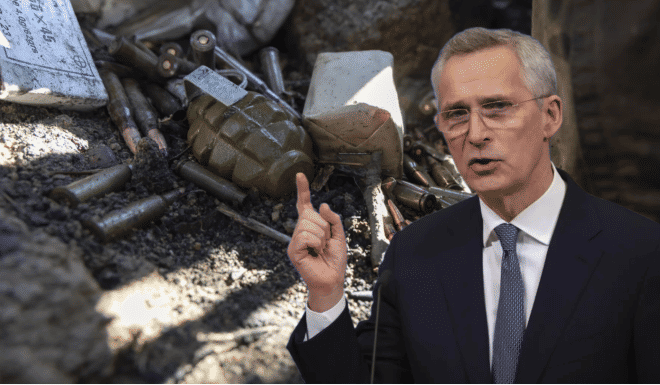Published 18:38 IST, June 13th 2024
NATO Endorses Ukraine’s Cross-Border Strikes Against Russian Forces
NATO Secretary General Jens Stoltenberg endorsed the decision by many alliance countries to allow Ukraine to strike Russian territory.

Brussels: NATO’s Secretary General Jens Stoltenberg has endorsed the decision by many alliance countries to permit Ukraine to strike Russian territory. Speaking at NATO headquarters in Brussels, he emphasized Ukraine’s right to self-defence. “The right of self-defence includes also striking legitimate military targets on the territory of the aggressor: Russia,” Stoltenberg stated.
Stoltenberg addressed a crowd of reporters near the entrance of NATO’s headquarters. Behind him, American and European officials arrived for a monthly meeting to coordinate support for Ukraine. This policy shift marks a significant change in NATO’s strategy and has implications for the ongoing conflict.
US Defense Secretary Highlights Russian Losses in Conflict
In his opening remarks, U.S. Secretary of Defense Lloyd Austin provided an update on the toll the war has taken on Russian forces. He detailed significant losses, including 350,000 casualties, 24 ships sunk or damaged, and 2,600 armoured vehicles destroyed. This meeting was the first since the U.S., following others in the alliance, loosened restrictions on the use of provided weapons.

Previously, the U.S. did not allow Ukrainian forces to use American-supplied munitions to strike Russian soil. This was due to concerns about escalating tensions with a nuclear-armed Russia. However, in late May, the policy was adjusted to permit strikes around Kharkiv, Ukraine’s second-largest city.
Strategic Adjustments Reflecting New Russian Offensives
Russia’s new offensive around Kharkiv prompted Western countries to reconsider their restrictions. Stoltenberg explained that the proximity of Kharkiv to the Russian border made it critical for Ukrainian forces to counterattack effectively. “If the Russian forces — the artillery, the missile batteries — were safe as soon as they were on the Russian side of the border, it would become extremely difficult for Ukrainians to defend themselves,” he said.

Since the policy change, Ukraine has utilized this latitude to strike Russian forces across the border. This has contributed to stabilizing the front lines near Kharkiv. Ukraine’s General Staff recently reported successful strikes on Russian air defence batteries in Crimea, likely using Western-supplied long-range systems such as the Army Tactical Missile System (ATACMS).
Balancing Military Support and Risk of Escalation
Despite these advancements, the U.S. still restricts Ukraine from using longer-range weapons to strike deep into Russian territory. Ukrainian leaders, including President Volodymyr Zelenskyy, have expressed both gratitude and frustration. They argue that the restrictions prevent them from targeting Russian bombers, which continue to pose a significant threat to Ukrainian cities.

American officials are cautious about lifting all restrictions due to concerns about escalation. They emphasize the importance of maximizing the strategic use of provided weaponry. Stoltenberg argued that the burden of avoiding escalation should not fall on Ukraine or its allies since Russia initiated the conflict.
NATO’s Support for Ukraine's Right to Self-Defense
“Ukraine has the right to strike military targets on Russian territory, part of the right to self-defence, and we have the right to support them in defending themselves,” Stoltenberg asserted. The question of how far Ukraine can extend its military reach will become more pressing with the anticipated delivery of F-16 fighter jets. The Netherlands and Denmark are leading this effort, with Ukrainian pilots undergoing training in the U.S.
U.S. officials frequently stress the importance of the combination of military equipment provided to Ukraine. Gen. Brown reiterated this perspective, highlighting that the broader set of equipment is more critical than any single capability. “It all comes together to give them just added capability to defend themselves,” he said.
Updated 18:38 IST, June 13th 2024


